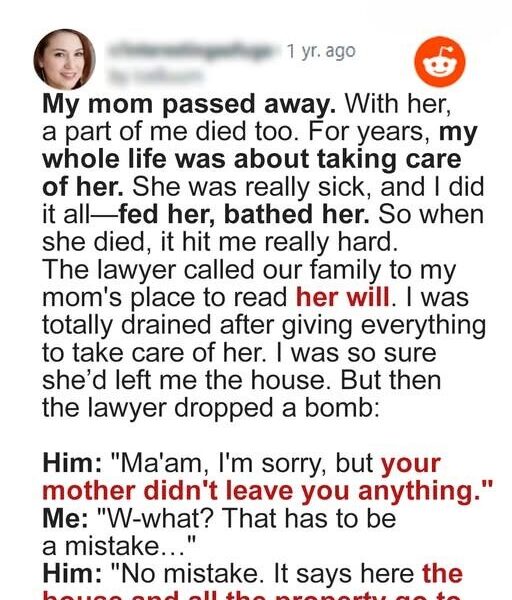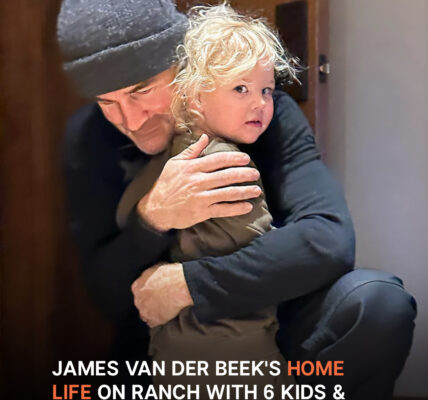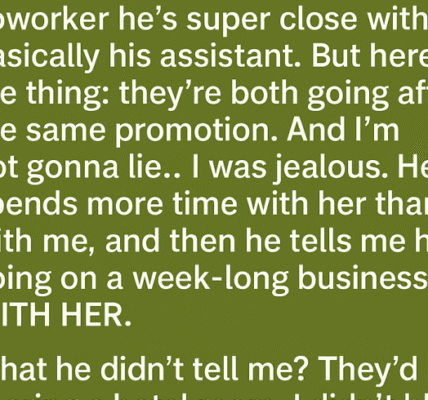My husband was doing his usual ‘I’ll do it in five minutes’ routine after I asked him to unload the dishwasher. I had a long day and snapped, ‘You always say that and never do it! I’m not your mom!’ He said nothing. The next morning, I woke up and saw the dishwasher still full, the sink piled with dirty bowls from his midnight snack, and a sticky note on the fridge saying: ‘I’ll do it tonight, promise.’
I sighed so hard my shoulders dropped. I was already running late for work, so I just poured coffee into my travel mug, grabbed a granola bar, and left. I spent the whole day distracted, reading the note over and over in my mind. Was this our life now? Sticky notes for promises? I didn’t want to feel like his nagging parent, but I also didn’t want to live in a constant loop of empty “five minutes.”
Driving home that evening, I rehearsed a big speech about respect and shared responsibilities. I walked in, ready to let him have it. But instead of him on the couch, there was an empty living room, dark except for the glow of the kitchen light. The dishwasher was still full. A second sticky note was on the counter: “Running late at work. Sorry.”
I picked up the note and just felt tired. I made myself a simple dinner, put the dishes in the sink with the others, and curled up on the couch. He didn’t come home until nearly midnight, creeping in like a guilty teenager. I kept my eyes on the TV as he tiptoed around, and he whispered, “Sorry, everything went crazy today.” I just nodded. We didn’t talk about it. We barely talked at all that week.
By Friday, our house looked like a war zone of plates and socks. We were both working so much that even simple chores felt impossible. But I couldn’t shake the resentment building in my chest every time I walked past that dishwasher. I felt like I was waiting for a bomb to go off.
That night, we were supposed to have dinner together. I even lit candles and put on music to make it feel like old times. But he texted me an hour after he was supposed to be home: “Got pulled into a meeting. Eat without me.”
I blew out the candles, put the plates back in the cupboard, and went upstairs to bed. The tears I’d been swallowing all week finally slipped out. I felt so alone in our marriage. Was this how it was going to be forever?
Saturday morning, he made pancakes. He was so cheerful it felt like whiplash. He handed me a plate and said, “I’m sorry about this week. I’ll catch up on everything today. I promise.”
I forced a smile and said, “Okay.” But inside, I thought: “Another promise. Another five minutes that never comes.”
He spent the whole morning cleaning. I was shocked. He folded laundry, vacuumed, and even started on the dishes. I watched him, part of me warming up, part of me afraid to hope. Around noon, he called me into the kitchen, smiling wide. “Look,” he said, pointing at the dishwasher. “All done.”
I looked. The dishwasher door hung open, dishes sparkling inside. But then I saw it: the dishwasher soap pod still sitting on the counter, unopened. The dishes were rinsed, but not actually washed.
Something in me snapped. I said, “You didn’t even run it. You don’t even care enough to check!” He looked confused, then embarrassed, then defensive. “Why are you making such a big deal? I tried!”
We argued for hours. Every sentence felt like pulling apart the threads of our marriage. He said I never appreciated what he did do. I said he never followed through. By the time we fell into bed that night, we were on opposite sides, backs turned, hearts heavy.
The next morning, he was gone before I woke up. I found a note on his pillow: “Going to clear my head. Be back later.” I spent the day in silence, cleaning the house to keep from crying. By sunset, he still wasn’t home. I texted. Called. Nothing.
At midnight, he walked in, face pale, eyes puffy. He looked at me like he’d seen a ghost. “I went to the lake,” he said quietly. “I thought I’d just sit there and think. But I ended up driving around, not sure where I was going. I almost kept driving. Away from everything.”
I felt like the air had been punched out of my lungs. “You were going to leave?” I whispered.
He sat down at the edge of the couch, hands shaking. “I don’t know. I just felt like I couldn’t get it right. Like I was failing you every day. And the more I tried, the worse it got.”
I reached out, my anger evaporating in a flood of fear. “You’re not failing. But we’re stuck. We can’t keep going like this.”
He nodded, tears welling up. “I know. I don’t want to lose you.”
For the first time in weeks, we talked. Really talked. We admitted things we’d been burying: how overwhelmed we both felt, how work was draining him, how I felt invisible. We realized we’d both been fighting for our marriage, but in opposite directions.
Over the next few days, we made a plan. We started with something simple: a fifteen-minute timer every night. During that time, we’d do chores together, no matter how tired we were. Folding towels side by side, sweeping the kitchen floor, or yes—unloading the dishwasher. It felt small, but it was something we could stick to.
The first night, we ended up laughing when he dropped a cup and it bounced harmlessly across the floor. The second night, we danced to silly songs while wiping counters. Little by little, the resentment softened, replaced by something warm and familiar.
One weekend, we decided to take a break from everything. We drove to a quiet cabin by the lake. We sat on the porch for hours, talking about our dreams, our fears, and even our silly arguments. We remembered why we fell in love: not because either of us was perfect, but because we made each other better.
When we got home, things weren’t magically fixed. He still forgot things sometimes. I still got frustrated. But now, we could laugh about it instead of letting it fester. I realized it wasn’t the chores that hurt me most; it was feeling like I was alone in carrying the weight of our life together.
One evening, he came home with flowers for no reason. He kissed me and said, “Thank you for staying. Thank you for believing we could get better.” I melted right there, because I knew he meant it.
A month later, we hosted friends for dinner. They commented on how happy we seemed, how we worked together so smoothly. I caught him looking at me with a soft smile, the same one he gave me when we first met. It was like a little secret between us: we’d been through the storm, and we were still here.
Then, something happened that neither of us expected. I found out I was pregnant. We hadn’t planned it, and my first reaction was sheer panic. But when I told him, he pulled me into his arms and whispered, “We’re going to be okay. We’re a team.”
The months flew by. We went to doctor’s appointments together, painted the nursery, and read every parenting book we could find. We still had our arguments—about baby names, about car seats, about how many onesies a newborn actually needs—but our fights ended with hugs now, not silent nights.
The day our daughter was born, he was right there, holding my hand, whispering how proud he was of me. When he first held her, his hands trembled like they did that night he almost drove away. But this time, his eyes were filled with joy.
We named her Lily, after my grandmother who always said, “Love is in the little things.” Every late-night feeding, every diaper change, every bleary-eyed morning felt like a chance to prove we’d learned that lesson.
One evening, when Lily was six months old, he stood at the sink after dinner. I watched him carefully load the dishwasher, measure the soap, and press start. He turned to me with a sheepish grin. “See? I did it.”
I laughed so hard I almost dropped Lily. He walked over, kissed my forehead, and took her from my arms so I could sit down. That moment felt like the universe was winking at us, rewarding all the tears and fights with something so sweet it almost hurt.
A few weeks later, he surprised me with a handwritten letter. He’d gone back to that lake, the place he once thought of leaving from, and wrote down everything he felt. In the letter, he promised not just to unload the dishwasher or do chores, but to show up every day, even when it was hard, even when he was tired. He promised to love me in the little moments, because that’s where life really happens.
I cried reading it. He’d always been a man of few words, but in those pages, he poured out his heart. And I realized something powerful: the five-minute promise wasn’t the enemy. It was our wake-up call. The words we toss out without meaning, the small things we put off—they can build walls or bridges, depending on what we do next.
The twist was this: the same man who once couldn’t remember a soap pod became the one who set reminders to warm up bottles, who memorized the lullaby she liked best, who danced with her in the kitchen just to make her giggle. The same routine that almost broke us became the foundation of our teamwork.
We still slip up. Some nights, the dishwasher waits until morning. Some mornings, we’re so sleep-deprived we bicker over silly things. But we’ve learned to come back together faster, to forgive quicker, to remember we’re on the same side.
If there’s one thing I hope anyone reading this takes away, it’s that love isn’t proven by grand gestures or perfect words. It’s proven in small moments of choice: do you turn toward each other, or away? Do you build walls of resentment, or bridges of understanding?
Our life isn’t perfect. But it’s ours, and it’s full of moments that matter. And I wouldn’t trade any of the chaos for a quiet life without him.
So if you’ve ever felt stuck, if you’ve ever thought you’d never get out of the cycle of arguments and silence, know this: it can get better. It starts with one real conversation. One promise kept. One hug after a fight. The love you build in those moments can carry you through storms you never thought you’d survive.
And when you come out on the other side, stronger and closer, it feels like the universe is smiling on you. Like the mess, the fights, the tears—they were all worth it for the love that grows deeper each day.
If this story touched you or reminded you of your own journey, share it with someone who might need a little hope. Like it so more people can see that sometimes, the biggest changes start with something as small as finally running the dishwasher.




